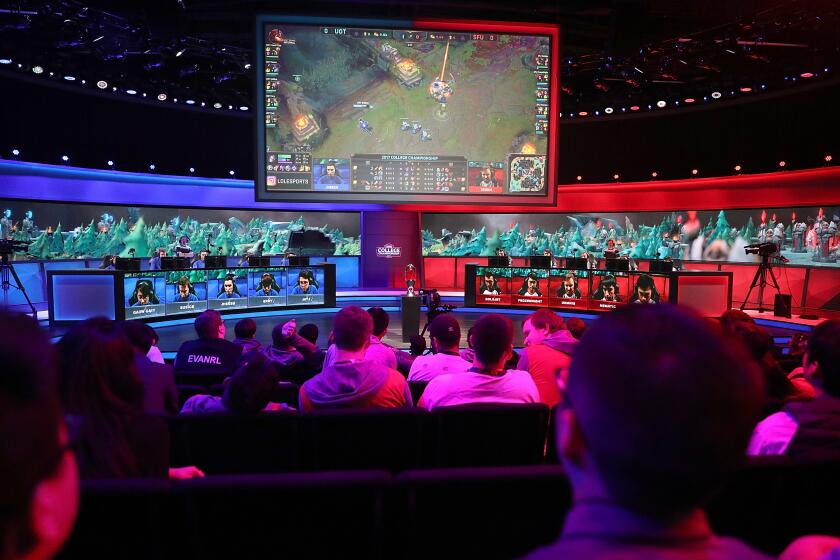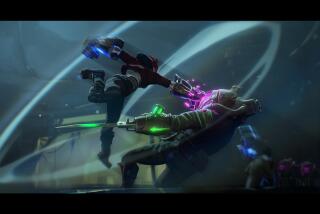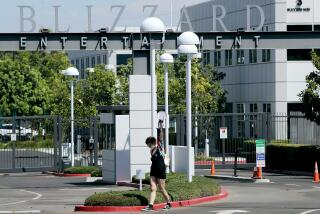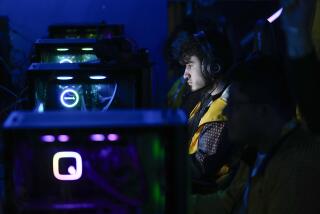This gamer’s punishment over Hong Kong protest shows China’s sway over U.S. companies
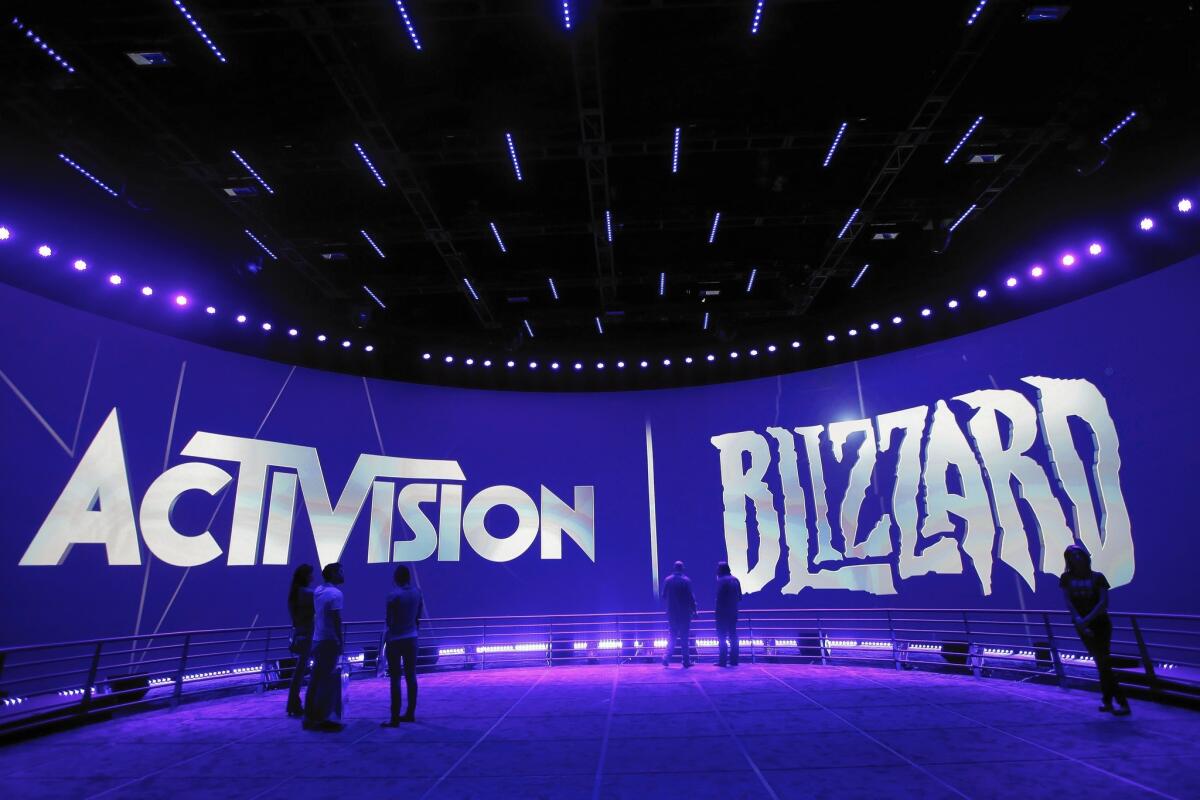
- Share via
The competitive professional esports player known as “Blitzchung” had just won a game in a tournament for the video game Hearthstone, and went on a Taiwanese broadcast to do a post-match interview.
He appeared on the screen in the gas mask and goggles typical of demonstrators in Hong Kong, who wear gear to protect themselves from tear gas and shield their identities from the government.
“Liberate Hong Kong, revolution of our age!” he yelled in Mandarin, as the two interviewers ducked down to hide their faces from the camera and avoid being associated with his political statement.
It was a costly bit of protest.
Blitzchung, whose real name is Ng Wai Chung, was supposed to collect $10,000 in award money for his participation in the Hearthstone Grandmasters competition. Instead, Blizzard Entertainment, the unit of Santa Monica-based gaming giant Activision Blizzard that runs the global competition, kicked him out of the tournament, revoked his prize winnings and banned him from Hearthstone esports for a year, all for expressing support for the pro-democracy protests currently roiling Hong Kong.
Ng, who lives in Hong Kong, declined an interview with The Times, saying he was overwhelmed by media requests. He told the gaming site IGN he expected the punishment and did not regret his protest. “I think it’s unfair, but I do respect their decision,” he said.
It’s only the latest example of an American company scrambling to rein in speech that rankles the Chinese government. From the National Basketball Assn. to Nike to Paramount Pictures, U.S. businesses are increasingly at pains to avoid any flare-ups that might cost them access to what will soon be the world’s largest consumer market.
Blizzard is facing a swell of criticism for the decision, on Twitter and Reddit as well as from elected officials.
“Blizzard shows it is willing to humiliate itself to please the Chinese Communist Party. No American company should censor calls for freedom to make a quick buck,” Sen. Ron Wyden (D-Oregon) tweeted.
Blizzard’s decision highlights the dependence of multinational businesses, including sports businesses, on China, said Clayton Dube, the director of the University of Southern California’s U.S.-China Institute. As companies have grown accustomed to making money in China, they have proven more wiling to accommodate demands of the Chinese government in order to stay in its good graces.
“The rules set at the top within China are trickling into these businesses outside of China ... it shows how global these businesses have become and how important China’s market is to the bottom line,” he said.
Blizzard was careful to portray its decision as a matter of rule-enforcement rather than a concession to China.
“After an investigation, we are taking the necessary actions to prevent similar incidents from happening in the future,” Blizzard said in a statement. Blizzard rules about tournament and player conduct prohibit participants from “engaging in any act that, in Blizzard’s sole discretion, brings you into public disrepute, offends a portion or group of the public, or otherwise damages Blizzard image.”
But on Chinese microblogging site Weibo, the official account of Hearthstone reposted Blizzard’s statement in Chinese -- with a significant change. “We will, as always, resolutely safeguard the country’s dignity,” it added.
Todd Harper, professor at the University of Baltimore’s program in Simulation and Digital Entertainment, was among those dismayed by Blizzard’s decision. That the policy is so broad and open to interpretation is concerning but not unusual, he said, notingthat most esports players face strict contracts and tournament rules. It’s the selective enforcement of such policies that is the real problem, he said.
“‘Overwatch’ players who make money streaming themselves playing might make a racist comment or use a homophobic slur, but the scale of punishment for those offenses doesn’t come close to this level of penalty,” Harper said. And racist and homophobic comments are “more culturally troubling, so Blizzard’s response is very telling and kind of sad.”
The esports market in China is considerably larger than in the United States. While video game industry consultant Mike Vorhaus said that roughly 10 million to 40 million in the U.S. watch esports, that number is easily 100 million in China. He said the industry was big in Korea and China before it caught on in the U.S.
“I think it’s very safe to assume publishers are much more sensitive to what’s happening in China than they are in other countries. It’s a huge market, and if you want to be there — no pun intended — you better play the game the PRC government wants,” Vorhaus said.
China nurtured homegrown companies that built separate search engines, phones and other digital infrastructure for the country and has long blocked easy access to Facebook, Twitter and other platforms that provide global reach. But gaming companies hosting multinational esports tournaments provide a rare space where that bifurcation between China and the rest of the internet is less pronounced, Dube said.
But Chinese gaming is heavily monitored by the government, Dube said. Visuals go through extensive vetting — while a character in a video game might look one way in the U.S., it might look completely different in China.
The Los Angeles Times previously reported that Tencent, a Chinese tech giant that owns Santa Monica-based Riot Games, built a system to track how much time individual gamers in China spent playing “League of Legends” and automatically lock out those who stayed on more than two hours per day. The move came as the company faced increasing pressure from Chinese state media and regulators for its role in a supposed video game addiction epidemic.
Activision Blizzard joins a number of international companies finding themselves embroiled in controversy around free speech linked to China. Luxury brands including Versace, Coach and Givenchy have all fallen afoul of Beijing’s demands to refer to both Hong Kong and Taiwan as parts of its territory and not suggest they are independent.
Even tech titan Huawei Technologies Co., a national darling, found itself under fire for the way it represented Taipei in its phone software. During the summer, China also requested more than 40 foreign airlines stop referring to China, Hong Kong and Taiwan as separate countries.
Most recently, China’s state media halted NBA broadcasts after Daryl Morey, general manager of the Houston Rockets, tweeted an image supporting Hong Kong’s pro-democracy movement, causing a swell of controversy.
The NBA has sought to expand in China since the 1992 Olympics, and the Rockets have been among the most popular teams in the country since they drafted Yao Ming in 2002. The NBA attempted to distance itself, with Rockets owner Tilman Fertitta tweeting that the general manager “doesn’t speak for the Houston Rockets” and that the Rockets are “not a political organization.”
An official statement acknowledged Morey’s statement had “deeply offended many of our friends and fans in China, which is regrettable.” The translated statement posted on Weibo said the league was “greatly disappointed” at Morey’s “inappropriate speech.”
An episode of “South Park” from last week that mocked Chinese censorship was wiped from big platforms in China. While the NBA met with outrage for its weak tone, garnering accusations that it cared more about preserving its business in China than upholding free speech values, “South Park’s” creators responded cheekily: “Like the N.B.A. we welcome the Chinese censors into our homes and into our hearts. We too love money more than freedom and democracy.”
There’s a lot at stake for Activision Blizzard, which has tie-ups with Chinese gaming houses Tencent Holdings Ltd. and NetEase Inc. to distribute — and in some cases co-develop — new entries in beloved franchises such as “Call of Duty” and “Diablo” in the world’s biggest video game market.
Blizzard’s partial ownership by Tencent creates pressure to self-police, said Eric Harwit, a professor at the University of Hawaii in Manoa whose work focuses on the spread of communications technologies in East Asia. Tencent has a lucrative contract with the NBA for streaming in China, which it temporarily suspended after the recent controversy.
“Tencent has already been eager to show they are not happy to have anyone associated with them align with the Hong Kong protesters,” Harwit said.
China is tracking gamers and punishing young players for “excessive” playtime — with the help of American companies, including Riot Games.
